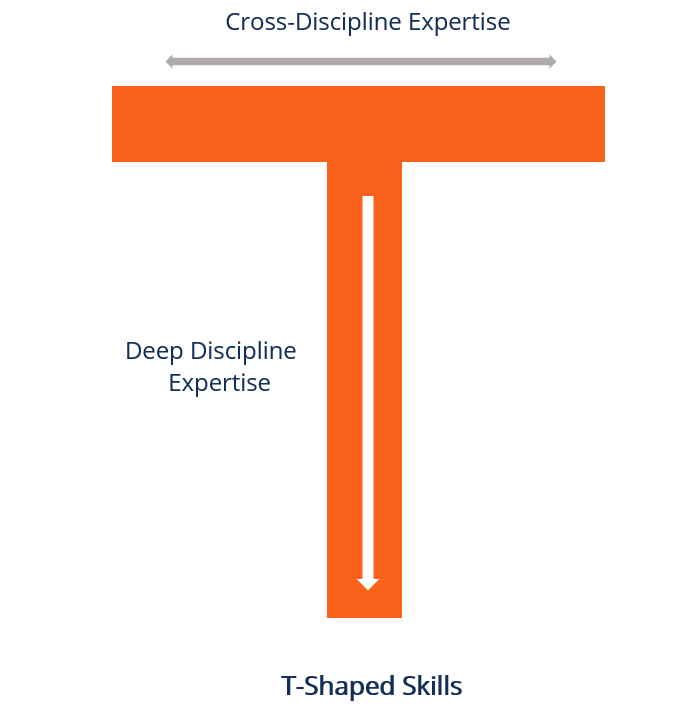Why mediocrity may be your gateway to greatness
Just okay at a bunch of things? It’s your time.
The currency of skills has shifted.
Remember T-shaped skills? It was a popular workforce development framework from a few years ago.
This is the idea that you specialize in one skill and then become a generalist in a whole bunch of areas.
It looks like this:
For example: if you’re good at analytics, but know a little bit about software development you’d be a good candidate for data science.
However, the AI economy demands a bit more.
Now you need a box of skills. Or a Swiss Army knife of abilities.
You have to harness a multitude of abilities as the cornerstone to your innovation.
You’re now in a world where mediocrity is the gateway to greatness.
Congrats.
It’s time for the jack-of-all-trades to finally thrive
I’ve always thought about this in the context of writing, especially as we’ve moved from a singular focus (creation) to multi-focused (creation to distribution on multiple platforms).
It’s now more advantageous to have multiple skills that you’re semi-competent at rather than one singular defining skill.
For writers, this includes not only the writing, but the ability to repurpose, the ability to write long and short, the ability to explain, to teach, and to create.
Even if you’re the most talented writer at craft, if you don’t have any interest in those other abilities, you probably won’t find as big of an audience.
Or you’ll need a lot of help—which is what publishers have been typically good at in the past.
But much of what was a skill and service in the past from publishers (initial parts of creation and distribution) are now functionally dropping in value.
It’s easier to edit.
It’s easier to design.
It’s easier to develop a marketing plan.
And to execute on it.
Adaptation in the AI era
AI content and consumer use had a rapid acceleration.
A few years ago I was running marketing for a startup when our founder encouraged me to use the OpenAI playground.
It was a lot different then, you had to set different parameters almost like a gauge for what you wanted the output to be.
It took tinkering. I was a little wary of it, and we didn’t use a ton of it. And the ones we did use we didn’t mention that it was AI.
We were scared of talking about it.
Now, however, talk about AI is in every single writing conversation. It’s only been 3 short years.
When I talk about AI with other writers or marketers, I always say the same thing: “It’s a place to start, not the place to finish.”
Use AI, don’t let it use you
Obviously, you don’t have to start with AI if you don’t want to, but it is a powerful brainstorming tool, another wrench in the toolbox.
But that doesn’t mean you take whatever AI gives you and immediately publish it. Some people do this, and I’ve done it a few times on a personal site just to see what would happen.
While AI can streamline certain processes, it cannot replicate the nuanced blend of human creativity and expertise.
You still need to think of ideas, stories, and plot points.
But AI generation can help you with that.
For instance, you can ask it to make an outline of Pride & Prejudice and then re-invent it.
But if have multiple skills across multiple domains, then you’ll better position yourself to thrive.
You’ll be that smart individual who can really “use” AI and not just be used by it.
Would love to hear your thoughts on this!1
Keep going-
Josh Spilker
A version of this article first appeared on Medium yesterday. This Substack one is a bit shorter.





Can AI read? Now that would be something. Because all ChatGBT does is combine a bunch of stuff from the internet.